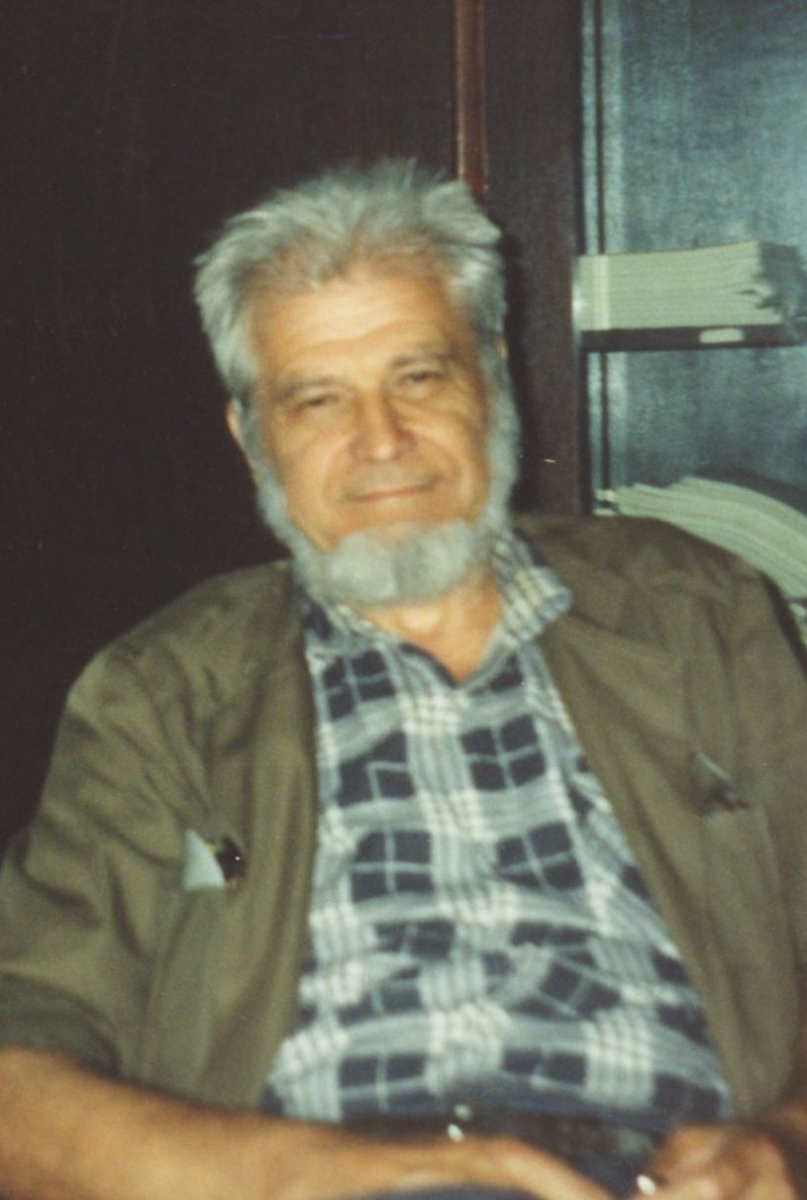Madis Kõiv
Madis Kõiv (5. XII 1929 – 24. IX 2014) was an Estonian physicist, writer and philosopher, and one of the most important playwrights of the 1990s. Kõiv worked from 1952–1961 as a teacher and then senior teacher in the physics department at the Tallinn University of Technology, and from 1960–1992, as a researcher in the theoretical physics sector at the University of Tartu Institute of Physics. He has written work in both standard Estonian and Võru dialect.
Although Madis Kõiv began writing at least twenty years earlier in the 1960s, he became a central and award-winning author in a re-independent Estonia after the collapse of the Soviet regime, when several Estonian theatres started staging his plays since the beginning of the 1990s. The action in Kõiv’s plays usually takes place in a visionary space that is hard to delineate in a conventional sense. The characters are usually people from an Estonian (e.g., the plays Tali (‘Winter’), Las olla pääle (‘Let It Be’) and Faehlmann, written with Vaino Vahing) or a wider European cultural history (Kokkusaamine (‘The Meeting’), Filosoofipäev (‘The Philosopher’s Day’), and Nero), but also simple peasants (Põud ja vihm Põlva kihelkonnan nelätõistkümnendämä aasta suvõl (‘Drought and Rain in Põlva Parish in the Summer of 1914’, written with Aivo Lõhmus), Küüni täitmine (‘Filling the Hay Barn’, written with Hando Runnel)). The characters in Kõiv’s plays usually find themselves in tense, existential situations in which nothing is certain. Philosophical questions are mixed with unresolved tensions in human relationships, often with war as a background to the action.
In addition to the plays, childhood memories have an important place within Kõiv’s work, appearing as a six-part novel series called Studia memoriae. In the series, the author engages in a rigorous study of his memories and the memory process. Madis Kõiv has also written very experimental modernist novels, such as Aken (‘Window’) and Päev (‘Day’), in which, besides a barely understandable plot, the central theme is the very sensitive worldview and often outright paranoid thoughts of the first-person narrator.
Madis Kõiv was a reclusive creative person. Although he received much recognition at the end of his life, Kõiv never joined the Estonian Writers’ Union and did not consider himself to be a professional writer. His sovereignty and independence as a writer is also recognizable from his texts; it is difficult to clearly define them according to genre, such as essay, novel, play, or philosophical discussion. Kõiv’s self-education as an autodidact in various fields was very extensive; he was particularly interested in the history of German thought and classical antiquity, as well as the history of science and philosophy in general. This has made his work multi-layered, even quite hermetic. On the other hand, it has also made his texts extremely productive and enduring, and a real intellectual challenge for future generations.
I. O. (Translated by M. M.)
Books in Estonian
Prose
Madis Kõiv, Vaino Vahing, Endspiel. Laskumine orgu. Tallinn: Eesti Raamat, 1988, 204 lk.
Rännuaastad. Studia Memoriae I. Tallinn: Õllu, 1994, 167 lk.
Kolm tamme. Studia Memoriae III. Tallinn: Õllu, 1995, 159 lk.
Aken. Tallinn: Õllu, 1996, 218 lk.
Kalad ja raamatud. Studia Memoriae IV. Tallinn: Õllu, 1998, 231 lk.
Kähri kerko man Pekril. Studia Memoriae II. Võro: Võro Instituut, 1999, 232 lk.
Attika Apooria, Elea tragöödia. Tartu: Eesti Üliõpilaste Selts „Veljesto“, 2000, 111 lk.
Keemiline pulm: autobiographia cryptica. Tartu: Akkon, 2002, 287 lk.
Päev. Tartu: Akkon, 2004, 367 lk.
Suvi Pääbul ja kinnijooks Raplas. Studia Memoriae VI. Tallinn: Eesti Päevaleht, Akadeemia, 2009, 349 lk.
Poisid ja tüdrukud. Studia Memoriae V. Tartu: EYS Veljesto, 2010, 622 lk.
Uudisjutte tegelikust ning võimalikest maailmadest; nägemused ja uned. Tallinn: Kultuurileht, 2013, 181 lk. [Loomingu Raamatukogu.]
Koolipoisid ja füüsikud. Tartu: Ilmamaa, 2014, 423 lk.
Plays
Madis Kõiv, Vaino Vahing, Faehlmann. Keskpäev. Õhtuselgus. Tallinn: Eesti Raamat, 1984, 127 lk.
Madis Kõiv, Aivo Lõhmus, Põud ja vihm Põlva kihelkonnan nelätõistkümnendämä aasta suvõl. Tallinn: Eesti Raamat, 1987, 142 lk.
Kolm näitemängu. Koostanud ja toimetanud Andres Laasik. Tallinn: Eesti Draamateater, 1997, 348 lk. [Sisu: ‘Kokkusaamine’; ‘Tagasitulek isa juurde’; ‘Filosoofipäev’.]
Jaanus Andreus Nooremb ehk Madis Kõiv, Hando Runnel, Küüni täitmine. Tartu: Ilmamaa, 1998, 104 lk.
Lõputu kohvijoomine. Tallinn: Eesti Draamateater, 2008, 304 lk.
Keskmängustrateegia: stseene kolmes vaatuses proloogi ja epiloogiga. Tallinn: Eesti Draamateater, 2015, 169 lk.
Collected plays
Näidendid I. Järelsõna: Luule Epner. Tartu: Akkon, 2006, 503 lk. [Sisu: ‘Castrozza’, ‘Turba philosophorum’, ‘Kammertükk’, ‘Las olla pääle’, ‘Faehlmann’ (kaasautor Vaino Vahing), ‘Võlumägi’.]
Näidendid II. Järelsõna: Luule Epner. Tartu: Akkon, 2007, 470 lk. [Sisu: ‘Hammerklaviersonate’, ‘Tagasitulek isa juurde’, ‘Peiarite õhtumängud’, ‘Tali’, ‘Omavahelisi jutuajamisi tädi Emmaga’, ‘Põud ja vihm Põlva kihelkonnan nelätõistkümmendämä aasta suvõl’ (kaasautor Aivo Lõhmus).]
Näidendid III. Järelsõna: Luule Epner. Tartu: Akkon, 2009, 447 lk. [Sisu: ‘Filosoofipäev’, ‘Kolmekesi toas’; ‘Stseene saja-aastasest sõjast’, ‘Lõputu kohvijoomine’ (kaasautor Leo Metsar), ‘Küüni täitmine’ (Jaanus Andreus Nooremb), ‘Võluvägi’.]
Näidendid IV. Järelsõna: Luule Epner. Tartu: Akkon, 2010, 542 lk. [Sisu: ‘Nero’, ‘Kokkusaamine’, ‘Finis nihili’, ‘Lahkumissoolo’, ‘Kui me Moondsundi Vasseliga pähklaid müisime ja keegi ei tahtnd osta’, ‘Kuradieliksiir’ (E.T.A. Hoffmani järgi).]
Essays and articles
Luhta-minek. Koostanud ja järelsõna Aare Pilv. Tartu: Ilmamaa, 2005, 681 lk. [Eesti mõttelugu.]


